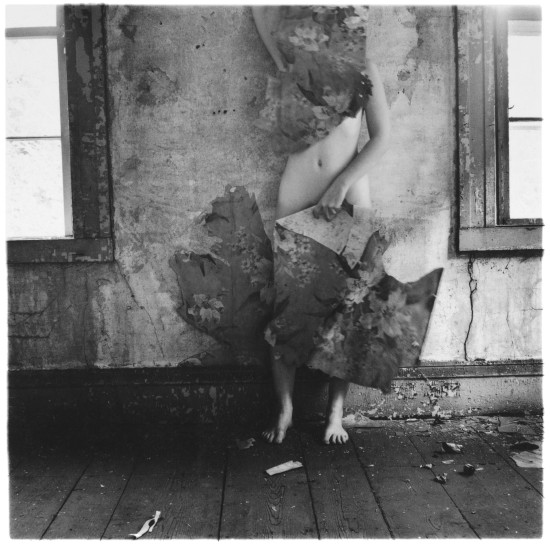
Francesca Woodman featured in The Paris Review
Ideas and a New Hat. By James McWilliams
Francesca Woodman’s playful darkness.
In 1912, the essayist Randolph Bourne wrote in the Atlantic Monthly that the ability to think “was given us for use in emergencies, and no man can be justly blamed if he reserves it for emergencies.” If the photography of Francesca Woodman can be reduced to one defining feature, it’s that she provides emergencies. Woodman’s emergencies are not loud or particularly dangerous; they don’t require alarms or intervention. But they do ask us to think, to ponder the urgency of an unorthodox kind of desire—a desire that insists, I am here, naked and soft, on one side of a wall, and I want to be over there, on the other side, where an equally naked and soft orchid flirts with me. This situation is serious.
For Woodman, who died in 1981 at twenty-two, convincing viewers to accept this predicament as crisis-worthy was a body-centered ambition. Feminist critics have long noted how she used her body to simultaneously court and reject “the male gaze.” Others have suggested that she posed as an unabashed object of seduction as an attention-grabbing tactic. Both claims seem generally credible. But what’s difficult to reconcile fully is how Woodman’s pictures—most of them, at least—tend to slowly sap her body of eroticism. The surrounding drama, in all its preoccupying power, overwhelms the potential for seduction. The extent of Woodman’s nakedness ends up reflecting no more or less than the relative need, under the particular circumstances, for clothing. “I am as tired as the rest of you of looking at me,” she once wrote in an undated letter. When clothes are involved, as they often are, they are necessary to the photo’s narrative.
Image: Francesca Woodman, House #3, Providence, Rhode Island, 1976.
- Doug Aitken
- Njideka Akunyili Crosby
- Milton Avery
- Jules de Balincourt
- Ali Banisadr
- Hernan Bas
- María Berrío
- Saskia Colwell
- Verne Dawson
- Stan Douglas
- Elmgreen & Dragset
- Inka Essenhigh
- Ian Hamilton Finlay
- David Harrison
- NS Harsha
- Alex Hartley
- Secundino Hernández
- Ilse D’Hollander
- Christian Holstad
- Kudzanai-Violet Hwami
- Chantal Joffe
- Isaac Julien
- Idris Khan
- Yayoi Kusama
- John Kørner
- Doron Langberg
- Wangechi Mutu
- Alice Neel
- Maria Nepomuceno
- Chris Ofili
- Jorge Pardo
- Celia Paul
- Grayson Perry
- Paula Rego
- Tal R
- Conrad Shawcross
- Hedda Sterne
- Do Ho Suh
- Sarah Sze
- Adriana Varejão
- Stephen Willats
- Flora Yukhnovich
- Doug Aitken
- Njideka Akunyili Crosby
- Milton Avery
- Jules de Balincourt
- Ali Banisadr
- Hernan Bas
- María Berrío
- Saskia Colwell
- Verne Dawson
- Stan Douglas
- Elmgreen & Dragset
- Inka Essenhigh
- Ian Hamilton Finlay
- David Harrison
- NS Harsha
- Alex Hartley
- Secundino Hernández
- Ilse D’Hollander
- Christian Holstad
- Kudzanai-Violet Hwami
- Chantal Joffe
- Isaac Julien
- Idris Khan
- Yayoi Kusama
- John Kørner
- Doron Langberg
- Wangechi Mutu
- Alice Neel
- Maria Nepomuceno
- Chris Ofili
- Jorge Pardo
- Celia Paul
- Grayson Perry
- Paula Rego
- Tal R
- Conrad Shawcross
- Hedda Sterne
- Do Ho Suh
- Sarah Sze
- Adriana Varejão
- Stephen Willats
- Flora Yukhnovich
Victoria Miro Venice
San Marco 1994,
Calle Drio La Chiesa
30124 Venice, Italy
t: +39 041 523 3799
info@victoria-miro.com
View map
Opening Times
During exhibitions:
London: Tuesday–Saturday: 10am–6pm.
Venice: Tuesday–Saturday: 10am–1pm & 2–6pm.
We are also closed on Sundays, Mondays and public holidays.
Admission free.
Enquiries
All general enquiries should be sent to
info@victoria-miro.com
Victoria Miro does not accept unsolicited artist applications.
Before contacting or subscribing please read our Privacy Policy
We respect the choices you make about how you would like to hear from us. You will find links at the bottom of all emails we send from our mailing list which allow you to Update your preferences to change the way we contact you, or Unsubscribe if you want to opt out.
Read our Modern Slavery Statement here.
Read our sustainability statement here.
Subscribe
Staff contact details
Directors
Sales
Exhibitions
Communications
Operations
Technical Services
Finance
This website uses cookies
This site uses cookies to help make it more useful to you. Please contact us to find out more about our Cookie Policy.